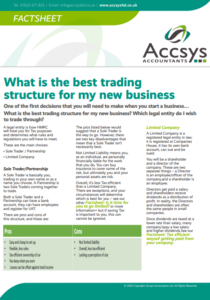The best trading structure for my new business

One of the first decisions that you will need to make when you start a business… What is the best trading structure for my new business? Which legal entity do I wish to trade through?
A legal entity is how HMRC will treat you for Tax purposes and determines what rules and regulations you will have to meet.
These are the main choices:
- Sole Trader / Partnership
- Limited Company
Sole Trader / Partnership
A Sole Trader is basically you, trading in your own name or as a name you choose. A Partnership is two Sole Traders coming together to trade.
Both a Sole Trader and a Partnership can have a bank account, they can have employees and register for VAT.
There are pros and cons of this structure, and these are:
| Pros | Cons |
| · Easy and cheap to set up
· Flexible, less rules · Tax efficient ownership of car · You keep what you earn · Losses can be offset against total income |
· Not limited liability
· Overall, less tax efficient · Lacking a perception of size |
The pros listed above would suggest that a Sole Trader is the way to go. However, there are two key disadvantages that mean that a Sole Trader isn’t necessarily best.
Not Limited Liability means you, as an individual, are personally financially liable for the work that you do. You can buy insurance to cover some of the risk, but ultimately you and your personal assets are risk.
Overall, it’s less Tax efficient than a Limited Company. There are exceptions, and your circumstances will determine which is best for you – see our other Factsheet: Is it time for you to go limited? or more information – but if saving Tax is important to you, this con cannot be ignored.
Limited Company
A Limited Company is a registered legal entity in law; it is registered at Companies House, it has its own bank account, can sue and be sued.
You will be a shareholder and a director of the company. These are two separate things – a Director is an employee/officer of the company, and a shareholder is an employee.
Directors get paid a salary and shareholders receive dividends as a distribution of profit. In reality, the Directors and shareholders are often the same people in small companies.
Since dividends are taxed at a lower rate than salary, many company’s pay a low salary and higher dividends. See our Factsheet: Tax efficient ways of getting paid from your company
| Pros | Cons |
| ·Easy to set up
·Limited liability ·Tax efficient |
· More expensive to run
· More rules, regulations and reporting deadlines – not flexible · Car ownership expensive · Requires more admin · Complicated to pay yourself · Losses kept in the entity |
So, which is best for me?
On the face of it, the Sole Trader seems to have far less disadvantages than a Limited Company, and you may therefore be tempted that this would be the best trading structure.
However, the answer is, it depends on your specific circumstances. For example, if you are likely to make a loss in year one, it would be better to start off as a Sole Trader and convert to a Limited Company. If you are likely to have significant profits in year one, then it would be better to be limited straight away.
It could be that you want to be perceived as a bigger company than you are, or that a customer of yours requires you to be limited.
There are several situations that will make your circumstances unique, and its best to speak to us before making any decisions.


